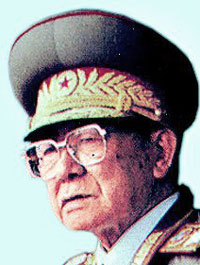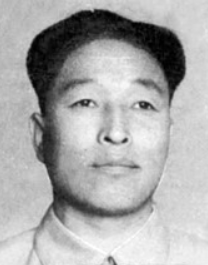
The Commander-in-Chief of the Armed Forces of Democratic People's Republic of Korea is the commander-in-chief of the Korean People's Army, the military of North Korea. The office was established on 4 July 1950 and abolished with the passing of a new constitution in 1972. Since then, the office of President of North Korea, the Chairman of the National Defence Commission and the President of the State Affairs Commission have been referred to as supreme commanders in accordance with the constitution.

Jo Myong-rok was a North Korean military officer who held the military rank Chasu. In 1998, he was appointed first vice-chairman of the National Defence Commission of North Korea, Director of the Korean People's Army General Political Bureau. Previously, he was the commander of the air defence forces.
O Jin-u was a North Korean general and politician. He was a close associate of Kim Il Sung. O served under Kim in the Northeast Anti-Japanese United Army, and then as commander of Kim's bodyguard. He was a founding officer of the Korean People's Army (KPA), fought in the Korean War, and was a Vice-Chairman of the National Defence Commission from 1972 until dying in 1995. He was considered to be the most powerful person in North Korea after Kim Il Sung and Kim Jong Il, a hardliner, and a strong supporter of North Korea's nuclear program.

Marshal Choe Kwang was a military leader in North Korea.
Ju Sang-song is a North Korean politician and former Minister of People's Security.
Kim Won-hong is a North Korean politician and military general.
General Choe Pu-il is a North Korean politician who served as head of North Korea's Ministry of People's Security.

Kim Ik-hyon was a North Korean politician and military officer. He was member of the Central Committee of the Workers' Party of Korea. He was elected to the 11th convocation of the Supreme People's Assembly in 2003.
Military Security Command of the Korean People's Army is the principal Counterintelligence agency of the Korean People's Army. As an abbreviation in Korean, it is also called as a guardian (bowi). The headquarters of the Military Security Command is in Longbuk-dong, Oseong area, Pyongyang. Its headquarters borders the Pyongyang University of Foreign Languages across a wall. In addition, several independent offices have been established in Pyongyang as branch offices.
Park Sung-won is a former military officer and politician of the Democratic People's Republic of Korea who was a member of the Central Committee of the Workers' Party of Korea. He served as delegate to the 12th convocation of the Supreme People's Assembly. In 2015, he defected.
Kim Hyong-ryong is a military officer and politician of the Democratic People's Republic of Korea. He is a member of the Central Committee of the Workers' Party of Korea and is a public diplomat of the Korean People's Army. He also served as member of parliament in the Supreme People's Assembly, North Korea's unicameral parliament.
Jong Myong-do is a North Korean politician and fleet admiral. He served as commander of the Korean People's Navy as well as member of the Supreme People's Assembly from the 10th convocation.
Pyon In-son is North Korean politician and military officer, colonel general and from March 2012 commander of the 4th Corps of the Korean People's Army.
O Kum-chol is an army general and politician in the Democratic People's Republic of Korea. He is a vice-chief of the General Staff Department of the Korean People's Army and a member of the Central Military Commission of the Workers' Party of Korea.
Ryo Chun-seok was a North Korean military officer and politician. Ryo was a general of the Korean People's Army, President of the Kim Il Sung Military University and a member of the Central Committee of the Party. He was delegate to the 12th convocation of the Supreme People's Assembly.
Kim Myong-guk (Korean: 김명국) was a North Korean politician and army general in the Korean People's Army. He was member of the Central Military Commission of the Workers' Party of Korea and served as member of the Supreme People's Assembly, North Korea's unicameral parliament.
Kim Kyong-ok was a North Korean politician and four-star army general in the Korean People's Army. He was a member of the Central Committee of the Workers' Party of Korea, first deputy director of the Organization and Guidance Department, and served as member of the Supreme People's Assembly.
Ju To-il was a North Korean army officer who served as the personal guard of Kim Il Sung held the rank of Vice-Marshal.
Kim Kwang-jin was a North Korean general and politician. He held the rank of Vice Marshal.
Ri Thae-sop is a North Korean politician and general. He served as Minister of Social Security and from June 2022 to December as Chief of the General Staff. He is also a member of the Politburo of the Central Committee of the Workers’ Party of Korea. He served as Commander of the 5th Corps and Commander of the 7th Corps.



